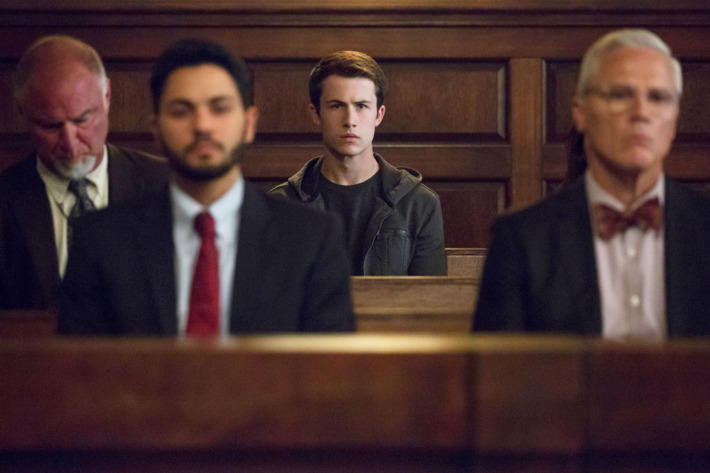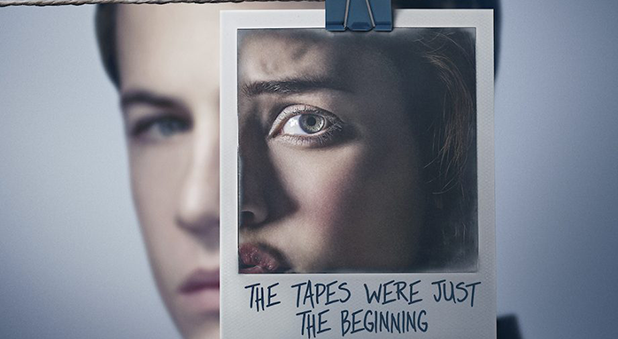With the most tweeted about show of 2017 back for a second season on Netflix, 13 Reasons Why continues to stir up controversy as they present some of the darkest moments of teens lives as confronting entertainment. Why is a show such as this so popular, and is it really good for people to be binge watching things like this? Warning: some spoilers ahead.
The lives of those at Liberty High School were shaken when Hannah Baker committed suicide, and left thirteen tapes explaining her reasons why. Season two picks up the story five months later, where people are still trying to grapple with the lasting effects of her death on their community. While season one was structured around Hannah’s 13 reasons, with one explored in each episode, season two takes us through the court trial between Hannah’s parents and the school. The season continues to raise controversial issues, graphically depicting sexual assault and gun violence.
One of the biggest critiques of season one was the carelessness of the way that these teen mental health issues were portrayed. Suicide was displayed as an act of revenge, where the deceased has the opportunity to see how others respond to her death and the tapes that outline her reasons. The support structures that exist in a teens life (such as school, counsellors and other safe adults) were portrayed as incompetent and useless when suicidal student Hannah Baker reached out to them. Netflix and the creators of the show have listened to such feedback and have taken a few steps in the right direction, by adding warnings to the start of each episode and pointing people to helplines and resources. However there is still an unhelpful theme of teenage autonomy throughout the second season. The most concerning is in the season finale, where instead of alerting authorities to a possible high school shooting, main character Clay chooses to instead jump in to resolve issues on his own.
“A young person could watch this show and think ‘No adult understands and is helpful or willing to help,’ and that’s a source of frustration,” says Ms Leonie Fernando, from Rosemeadow Appin Church. Ms Fernando is a social worker in a high school and is also a certified Mental Health First Aid trainer. She feels that the lack of support from adult characters for the teens is a concern. “There’s no positive experience showcased. In essence the unhelpful stuff is that young people could walk away more vulnerable if they were already in that headspace themselves. But if it does get young people reaching out, that’s a good outcome. I happen to work at a school who are working very hard to raise the issues of wellbeing and advocate for help seeking both in and outside the school."
"I feel like 13 Reasons Why set us back a little bit, because you could watch that show and think that your school would never understand.”
The shows popularity makes one thing clear - the themes of the show connect to the experiences of young people. Miss Ingrid Peters, psychologist and Christian, says that a show like this can be a helpful tool for sparking conversations in our churches. With 75% of all mental health issues beginning in teenage years, as Christians we shouldn’t shy away from discussing these topics. “Teenagers make haps of mistakes, and often because of their fear of judgement or being found out, they stop disclosing to youth leaders or churches,” says Miss Peters, who has worked in teenage psychology for over a decade. “The wonderful thing is when they do watch a show like this, you’ve got an in road to talk about this. Lots of people feel you have to wait. If your kid loves a show about mental health, they’ve opened the doorway for you to ask questions. And you can ask things like “have you ever experienced this type of bullying? Do you think this is a fair way for them to manage it?” Talk through the broader concepts. Anyone who is considered a good connection by the teen can have these conversations.”

The question isn’t whether we should watch a show like this or not. There are Christians who will decide to watch, and there are Christians who will decide not to. Instead we need to be ready to help people as they wrestle with 13 Reasons Why. Our churches need to be safe spaces for these conversations to take place, so be prepared to ask questions, be ready to listen and know where to point people for help if they need it. Most of all, be ready to help them think through these issues and fix their eyes on Jesus.
For more resources for young people, you can head to Headspace. 13 Reasons Why have also collaborated with mental health organisations to create resources to help young people.


























